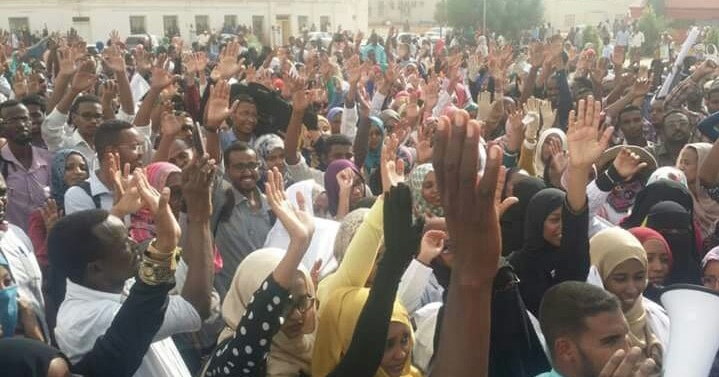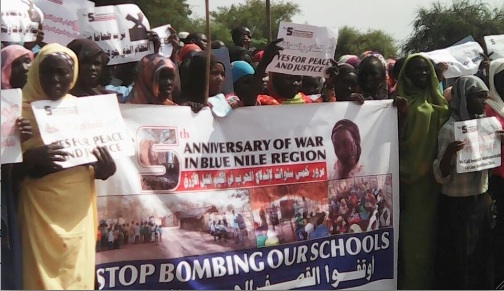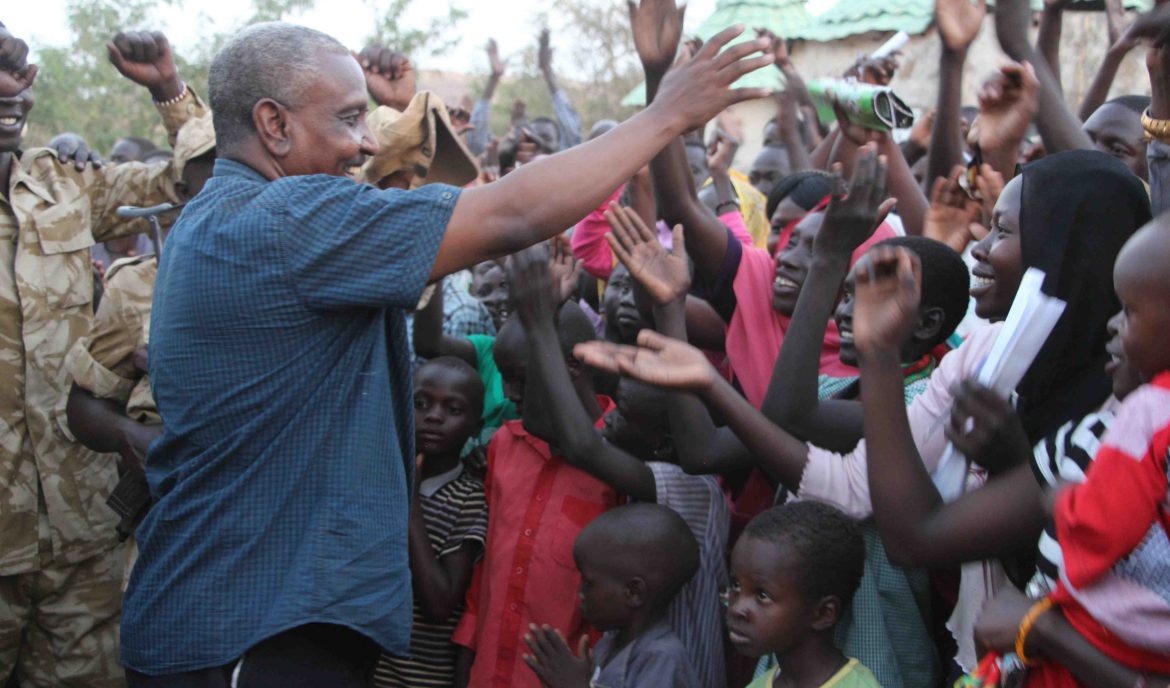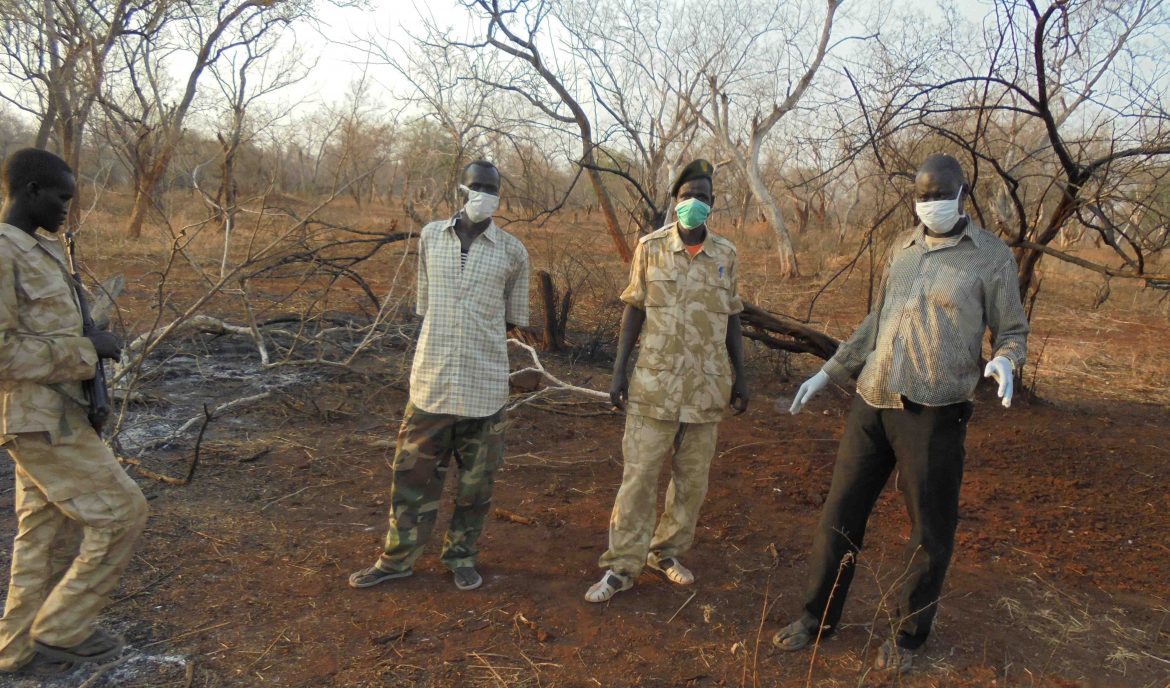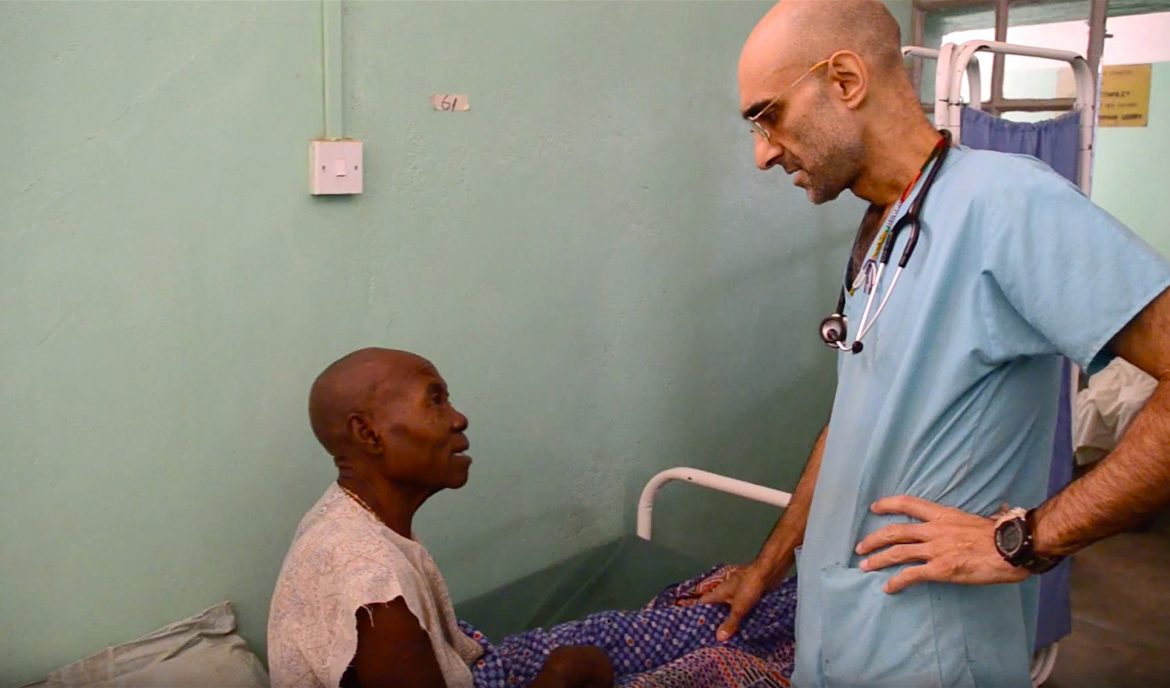In our latests Sudan Insider, we provide news and analysis on:
- Allegations that Sudan may be using chemical weapons in Darfur and Nuba Mountains
- President Omar al Bashir declares another ceasefire while peace talks remain in limbo
- Blue Nile refugees call for an end to the war, lack of aid
- Doctors across Sudan protest against poor conditions and lack of equipment / supplies
To receive these in your inbox, subscribe to the monthly update. ………………………………………………………………………………………………………………………. Potential chemical weapons in Darfur, Nuba Mountains
What happened…
A recent report by the human rights organization Amnesty International alleges Sudan may have used chemical weapons in their aerial offensives against rebels in Jebel Marra, Darfur, this year.
The report claims the Sudan Air Forces [SAF] conducted at least 30 chemical attacks in Jebel Marra this year; the most recent took place on September 9. Based on testimonies, as many as 250 people may have been affected.
Two separate independent chemical weapons experts concluded the injuries and symptoms in the report suggest a chemical attack from blister agents such as sulfur mustard, lewisite or nitrogen mustard gases. But without soil or blood samples, it is impossible to fully confirm.
While Darfur rebel leader Abdel Wahid Al-Nur claims as many as 1,500 people have died in the Jebel Marra region from chemical weapon attacks, several Sudanese government officials, including SAF Spokesman Ahmed Khalifa al-Shami, deny the allegation.
Potential cases of aerial chemical weapon attacks may have also occurred in the Nuba Mountains, South Kordofan State, on two occasions, according to medical practitioners. Mother of Mercy Hospital said they treated 18 victims of possible chemical weapon attacks by SAF during fighting in Talodi town in April 2012.
Both Mother of Mercy Hospital and Lewere Hospital in the Nuba Mountains believe another aerial SAF attack may have used chemical weapons around late March or early April this year during the ongoing conflict in Al-Azrag, Heiban County. Neither incident, however, has been confirmed.
What it means…
While the Amnesty International report cannot confirm the use of chemical weapons, it contests Sudan government claims the war in Darfur has ended. At the end of July 2016, the UN estimated that a quarter of a million people may have been displaced by violence in Jebel Marra.
As a signatory to the Convention on Chemical Weapons, Sudan may face serious setbacks to their improved relations with Western countries. Both the U.S. and Europe have softened their stance toward Sudan this year over the latter’s pledges to assist the west in curbing migration and terrorism.
France, Britain and the European Parliament have called on Sudan to allow the Organisation for the Prohibition of Chemical Weapons to investigate the allegations of chemical weapons usage in Darfur.
Proving the use of chemical weapons in Sudan, however, is incredibly difficult since authorities block international organizations and media access to both conflict areas in Darfur and the Nuba Mountains. No journalist, human rights investigator or humanitarian actor has been permitted access to Jebel Marra, for instance, in 2016. Amnesty International had to conduct its research for Jebel Marra through interviews and satellite imagery, deprived access to collect physical soil samples from the region.
The UN – African Union hybrid peacekeeping force, UNAMID, has also routinely been denied access to the restive Jebel Marra area and could not confirm or deny Amnesty’s allegations that authorities had used chemical weapons in their attacks. ………………………………………………………………………………………………………………………… Another ceasefire, peace talks in limbo
What happened…
Informal peace talks held on October 2 in Ethiopia’s capital, Addis Ababa, ended with no breakthrough between the Sudan government and the Sudan People’s Liberation Movement – North. The Ugandan government brokered the meeting in support of the African Union mediation team led by Thabo Mbeki.
Both sides traded accusations of insincerity as they continued to disagree over humanitarian access. The government continued to refuse cross border aid and insisted all aid stems from Khartoum. During the August 14 peace talks, the SPLM-N eventually presented a compromise: 80 percent of aid comes across front lines from government-controlled areas in Sudan, while 20 percent would come cross border from Asosa, western Ethiopia under Sudanese government supervision.
The government delegation called for a new initiative during the informal talks involving the government, SPLM-N, United Nations, African Union and representatives of aid groups to assess needs and co-develop humanitarian interventions.
SPLM-N Secretary General Yasir Arman, however, said they might end all talks with the government and demand the UN and African Union and conduct an inquiry into the potential use of chemical weapons by the Sudan army in Darfur, Blue Nile and South Kordofan. This comes after human rights organization Amnesty International released a report in late September potentially implicating Sudan in using chemical weapons in Jebel Marra, Darfur this year.
During the closure of the National Dialogue conference on October 11, a state-led peace initiative in Khartoum, President Omar al-Bashir announced a two-month extension to the ceasefire for the conflict in the Two Areas: South Kordofan and Blue Nile states.
What it means…
Both sides harbor deep suspicions over humanitarian access, accusing each other of misusing aid corridors to smuggle through military supplies. The SPLM-N also suspect humanitarian aid from Khartoum will simply not materialize and therefore insist 20 percent of aid comes cross border from Ethiopia. Providing aid to the rebel-controlled areas would renege SAF’s military strategy to cut food supplies, forcing civilians to relocate to government-controlled areas.
The government’s latest proposal to incorporate international monitors in the humanitarian aid delivery has received little support since similar proposals made in the past were never implemented. In August 2012, for instance, Sudan and South Sudan signed separate memoranda with the African Union, the League of Arab States and the United Nations – known as the tripartite agreement – to allow aid into the Nuba Mountains and Blue Nile State. The agreement established a roadmap for delivering humanitarian aid, but was never implemented.
While both sides continue to squabble over humanitarian aid access points, some civilians in rebel-controlled areas are facing severe food shortages. The destruction and occupation of farmlands and markets during the conflict along with poor harvests has created a hunger gap this year in the Nuba Mountains that could lead to starvation the next.
President Bashir’s ceasefire declarations appear designed for political capital rather than genuine peace. Sudan Armed Forces (SAF) are still present in the SPLM-N-controlled Nuba Mountains, occupying key farmlands in Al Azrak, Mardes and Um Serdiba, effectively blocking thousands of civilians from food supplies and roughly 40,000 inhabitants from returning home to these locations.
Even with the president’s ceasefire declaration, Sudan appears ready to re-launch their military offensive in December in the Two Areas. Bashir announced at the closure of National Dialogue conference that they would militarily crush opposition forces that did not sign onto a “national document” – a document derived from the National Dialogue initiative that outlines plans to curb tribalism, poverty and civil conflict. The SPLM-N and Darfur rebel groups have refused to participate in the National Dialogue, claiming the dialogue is subjected to government manipulation and would not procure genuine peace.
The fact that Ugandan president Yoweri Museveni was invited to broker the informal peace talks signifies a thawing of relations between the two countries after decades of strained relations. Bashir is accused of supporting the Ugandan rebel group, the Lord’s Resistance Army, during the civil war with the former South Sudanese rebels as a countermeasure to Museveni’s support to South Sudan. On May 12, President Omar al Bashir travelled to Uganda to attend the fifth inauguration of incumbent President Yoweri Museveni in Kampala, once again defying an International Criminal Court warrant for atrocities committed in Darfur. …………………………………………………………………………………………………………………………. Blue Nile refugees protest over war, lack of aid
What happened…
Refugees predominantly from Blue Nile State now residing in the restive Maban camp, Upper Nile State, South Sudan, conducted two separate protests last month. In early September Maban refugees launched a demonstration calling on local, regional and international authorities to end the five-year civil war, among other demands.
In a petition submitted to local authorities and the United Nations, the protestors called on the international community to conduct ICC investigations into potential crimes against humanity in Blue Nile and South Kordofan states and use the U.N. Security Council to ensure humanitarian access reaches Blue Nile State. In addition, they called on African states to place more emphasis on peace mediation with the Sudanese government. The petition also called on the Sudan government to protect civilians from aerial bombing campaigns and release prisoners of war.
Later in the month, refugees in Gendrassa Camp staged a protest after the aid organization, Agency for Technical Cooperation and Development (ACTED), delayed distributing food assistance. After protestors injured some ACTED staff and destroyed offices, South Sudan police started to arrest 25 chiefs and 16 youth that were near the food distribution center, according to local aid agency reports.
Police beat and sentenced the 16 youth without investigation for two years. All but two were released recently after each paying a fine of SSP 2,850 (roughly USD 58), local sources said. One of the youth, Issa Manjal, died while in police custody from a suspected diabetic condition. A committee has been formed to investigate the cause of death. The 25 chiefs were released after two days without charge.
What it means…
This is not the first time a refugee has died while in police custody in Maban. In May last year, police reportedly held Hadid Sirdal, a refugee father of four children, in an airless container in neighboring Bunj town whereupon Sirdal died.
But the violence is much worse between Blue Nile refugees and the host community in Maban. Having fled hunger and conflict in Blue Nile, many refugees have found further insecurity and limited food supplies in Maban. In September, for instance, a conflict between refugees and the host community in Maban forced 800 refugee households to move back to Blue Nile State. This is one reason why Maban refugees are strongly pushing for peace: They find themselves trapped in an untenable existence between two insecure locations, home and Maban.
Tensions stem from limited resources. The civil war in neighboring South Sudan has reduced the host community’s ability to cultivate. Unable to support themselves, the host community is generally unwilling to support a refugee population of 135,000 – more than double the host community’s population. The conflict has also limited aid agencies’ ability to safely deliver aid, forcing them to use costly air-dropped supplies. The UN aid agency, World Food Programme, was also forced to cut rations by 30 percent due to funding shortages. The limited aid has induced more competition for cultivatable land, firewood and water supplies between communities – exasperating the enmity further.
Even peacemaking efforts can end tragically. A deadly conflict erupted in June in Maban camp after the UN Refugee Agency organized a football match between refugees and the host community in an attempt to improve community relations. The conflict resulted in the death of three people and injured several others. ………………………………………………………………………………………………………………………… Sudanese doctors strike across the country
What happened…
After an eight day national strike, the independent doctors’ union, the Central Committee of Sudanese Doctors (CCSD) ended a strike on October 13 and resumed work in all hospitals across the country.
The decision came after the CCSD met Vice President Hassabo Mohamed and Health Minister Bahr Idriss. Authorities agreed to introduce a bill to protect doctors and improve working conditions in hospitals. The Health Minister also pledged to immediately rehabilitate 23 of the largest Sudanese hospitals, news reports said.
On October 6, the CCSD launched a nationwide strike to protest poor working conditions, lack of medicines and other medical equipment, as well as to call for protection after increased attacks by frustrated patients and family members. Sudanese media reported several attacks on doctors by relatives of patients as well as policemen angry about alleged delays in the treatment of fellow officers.
At first, Sudan’s Health Minister Bahar Idriss downplayed the magnitude of the strike but met with the union on October 12 for mediation. In a press conference the same day, the minister said they had imported $1.2 billion worth of medical equipment and medicines to meet the protestor’s demands, dismissing claims the material had been kept in ministry stores.
Poor salaries and working conditions partly explain why a boom of private health facilities has emerged in Sudan with over 1,400 private hospitals nationwide. A study by a state health research body, the Public Health Institute, estimates that three-quarters of Sudanese doctors are leaving Sudan to work abroad due to “poor financial rewards [and a] bad work environment.”
What it means…
The explosion in private health facilities is also partly rooted in state corruption. Officials cut public services and pocket funds while promoting the lucrative health care industry. Medicine and procedures that are normally free to the public now come at a cost. The government focus on promoting private facilities to the detriment of public ones is one reason why doctors are protesting poor facilities and meager medical supplies found at public hospitals.
Khartoum State Health Minister Mamoun Homeida, for instance, is also the head of the private University of Medical Sciences & Technology in Khartoum and owns several private hospitals. The state minister has been accused of using his position to privatize the heath sector, an allegation he denies.
Senior medical specialists also refrain from seeing patients in public hospitals, inducing patients to pay high consultation fees at the specialists’ private clinics, according to reports.
The government should be concerned over the doctor union’s strike considering the historical legacy. Sudanese doctors’ trade unions played a key role in the 1985 revolution, toppling former dictator Jafar Numeiri. For this reason, authorities have routinely cracked down on civil action from the medical profession, including starting a pro-government doctor’s union in a bid to destabilize the original trade union.

